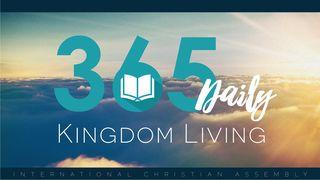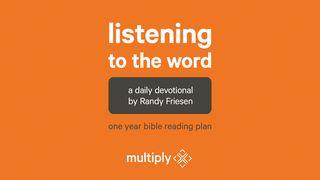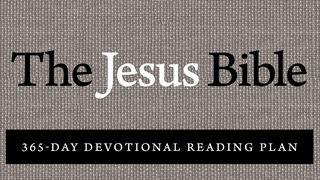Plan info
For The Love Of GodSample

ISAIAH 50 HAS A TRANSITIONAL importance that belies its brevity. In Isaiah 50:1-3 God addresses the children of Israel in exile, especially those who think he has utterly abandoned them. He hasn’t. He has neither divorced their mother, i.e., Zion, nor sold them into slavery to pay off some creditor—so the way back to him is still open. In this light, the last two lines of Isaiah 50:1 should be read as irony: if the children were “sold” or the mother “sent away” in any sense, it was because of their sin, not because of some final legal action on God’s part. Moreover, the sovereign Creator is certainly capable of bringing them back (Isa. 50:2b-3). The real question is, why did none of them come to him when he called? (Isa. 50:2a).
Then the Servant speaks (Isa. 50:4-9), more to himself than to others, but so as to be overheard (Isa. 50:10-11). Who is he? There have been many suggestions: Isaiah, or a sixth-century disciple of Isaiah; Jeremiah; Israel, personified as an abused and suffering person (cf. Ps. 129:1-3). As the book unfolds, Isaiah will make the Servant’s identity clear. Even now, observe his characteristics: This Servant is a gifted counselor. His words sustain the weary, for he himself has an ear for all the Sovereign Lord says, and he has not been rebellious (Isa. 50:4-5—unlike Israel). Thus he is a perfect disciple, but of the Lord, not of Isaiah (compare John 5:18ff.). He does not draw back from obedience (Isa. 50:5), even in the face of implacable abuse (Isa. 50:6; cf. Matt. 27:30; Mark 14:65; 15:19). The Sovereign Lord sustains him in his mission, so he sets his face like a flint to complete the task assigned him (Isa. 50:7; cf. Luke 9:51), confident that God will finally vindicate him (Isa. 50:7-9; cf. Phil. 2:9-11).
How, then, does the second part of this chapter relate to the first? Surely in this way: those who are addressed in Isaiah 50:1-3 still seem alienated, distant, unresponsive, cynical, while here in Isaiah 50:10-11 a line is drawn in the sand, and this line concerns the Servant. On the one side is the person who “fears the LORD and obeys the word of his servant,” who despite the terrible darkness that now engulfs him “trust[s] in the name of the LORD” (Isa. 50:10, italics added). On the other side is the person who tries to provide his or her own light, who lights fires of rebellion; God says to such a person, “This is what you shall receive from my hand: You will lie down in torment” (Isa. 50:11). Thus the identity of “the people of God” is undergoing subtle redefinition. In Isaiah 49:8-12 they embrace both Israelites and Gentiles; here one element that defines them is that they obey the word of the Lord’s Servant.
About this Plan

A daily devotional for discovering the riches of God's word: For the Love of God is a daily devotional designed to walk a person through the Bible in a year while assisting the reader in discovering the riches of God's W...
More
We would like to thank The Gospel Coalition for providing this plan. For more information, please visit: thegospelcoalition.org









